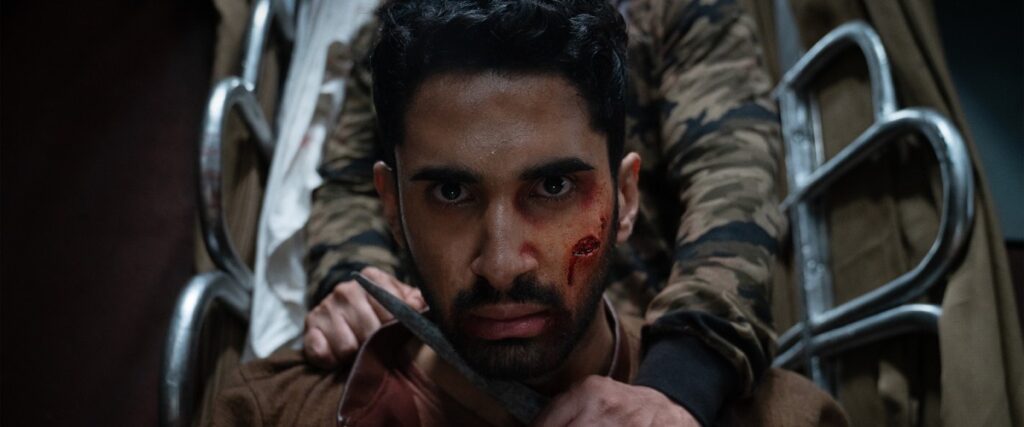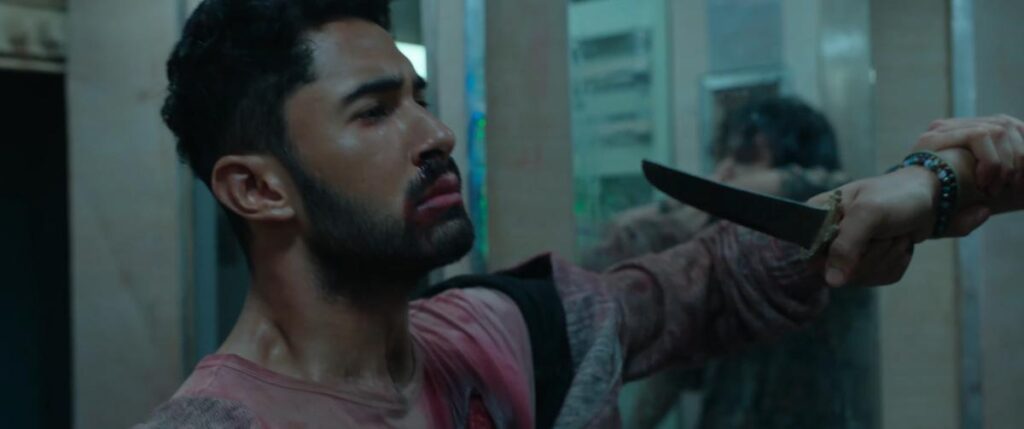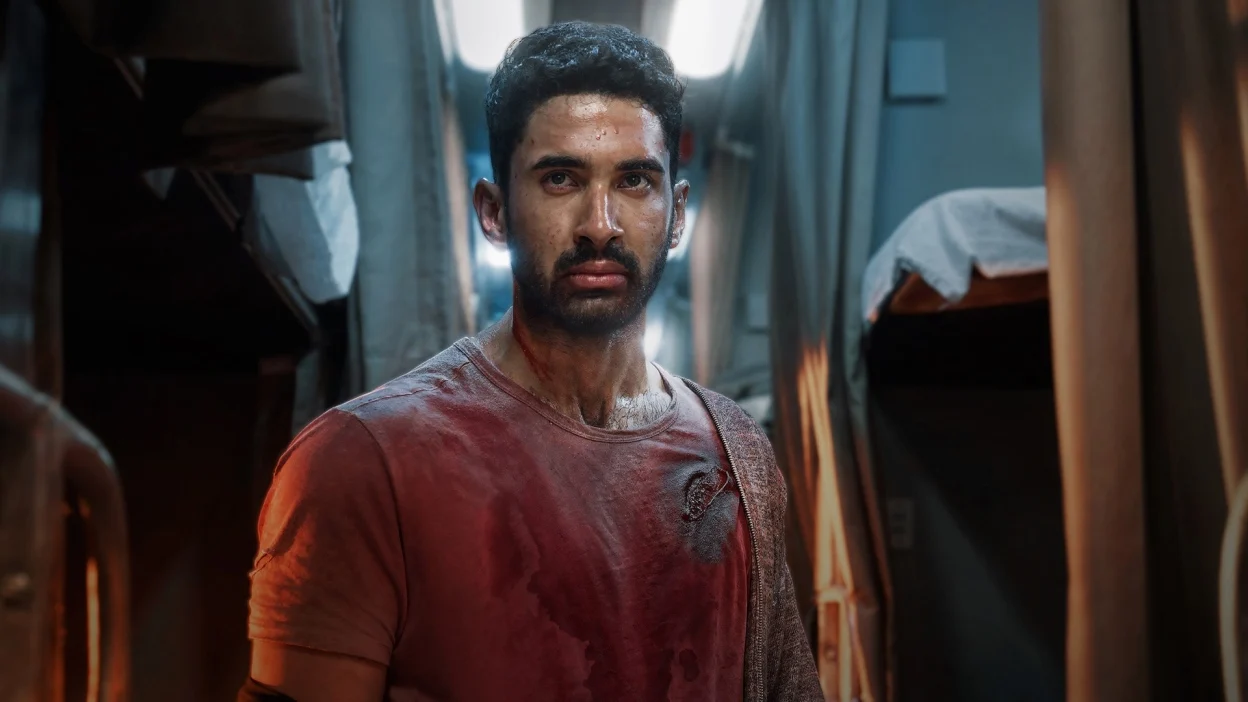Hindi action films have long been a vehicle for celebrating male machismo and glorifying hero worship. They are often depicted as larger-than-life characters who are infallible, and their moral compass is unwavering. Such attributes most of the time helped filmmakers catering to the masses enhance the larger-than-life persona of their superstar to perpetuate traditional notions of masculinity and create enduring archetypes that resonate with audiences. This strategy has most of the time helped such films to set the cash registers ringing at the box office. Nikhil Nagesh Bhat’s Kill also features an invincible fighting machine as a protagonist who can single-handedly take on multiple adversaries and restore justice. What makes this thrilling action drama distinct from following the trend is its lack of idolization of the protagonist and its deviation from traditional notions of masculinity. Set within the confines of a train, the less-than-two-hour pulse-pounding fest is filled with graphic, bloodcurdling, skull-smashing moments, one after another, designed for the sheer pleasure of watching action without any excess. It comes across as a fresh approach to the genre of rescue and revenge drama, a refreshing departure from the doldrums of crowd-pleasing commercial cinema.
Tulika (Tanya Maniktala) is compelled by her affluent father Baldev Singh Thakur (Harsh Chhaya), owner of a transport service in Jharkhand, to get engaged against her will in Ranchi. Her boyfriend Amrit (Lakshya), a National Security Guard (NSG), attends the ceremony and tries to convince her to elope with him. But she refuses, and Amrit returns back to his hotel with colleague and friend Viresh (Abhishek Chauhan). Later, Tulika messages Amrit that along with her family she would leave for Delhi by an overnight train the next day. Amrit and Viresh board the same train and travel with Tulika and her family. A group of bandit families headed by Beni (Ashish Vidyarthi) has decided to rob the train. Feni (Raghav Juyal), son of Beni, and his team board the train. They seal off the AC compartments, jam the phone signal and cut off the alarm chains. As they begin looting the passengers, Feni gets attracted to Tulika and discovers that her father is a wealthy businessman. He considers this to be a jackpot and tries to take advantage of the situation. But things get out of his control as Amrit and Viresh intervene.

Kill has been billed as the most violent Indian film, and it genuinely lives up to its expectations. It does not rely on the crutch of gravity-defying moments or too much reliance on special effects and slow-motion shots to make the adrenaline pump. The brutality of the action sequences are evenly distributed into two halve-pre and post interval, where the intensity and goriness heighten gradually. It helps in creating progression in the steps taken by Amrit to cull his opponents. The band of bandits who had instilled fear among the passengers gradually becomes terrified by the mayhem unleashed by a trained commando, illustrating how the terrorizers can also become the victims. Moreover, since the brigands are kith and kin, the loss of the members intensifies their sense of vulnerability and despair. In one of the scenes, we observe how a mother, whose child has been mercilessly stabbed during a fight, becomes violent and in a fit of rage reduces the culprit to a pulp. It conveys that during a moment of extreme desperation, people can exhibit primal or animal-like behavior. Similar to many action films, this one also includes a scene where the protagonist removes his apparel to expose his well-toned body. However, unlike others, he does so to attend to his wounds, imbuing his action with purpose rather than merely aiming for a clap-worthy moment.
The screenplay by Bhat and Ayesha Syed is structured with sharply constructed moments that make the action beats of the film pulse with intensity and purpose. But it misses the emotional quotient that could have provided a more fulfilling catharsis. As Amrit begins his rampage, it becomes the need of the hour and we empathize with his state of mind. After a point, the action scenes become repetitive, and we begin to lose interest as it fails to generate the suspense and anticipation needed to keep us fully engrossed. One could argue that the minimalist design and limited timeline suit a low-key approach, making multiple plot points hard to incorporate. However, this does not justify a film prioritizing action over character development. Moreover, one wonders why Baldev Singh Thakur, being such a powerful and rich man, would decide to travel by train instead of by flight. It seems like a choice made by the writers for convenience rather than providing a plausible reason.

The cinematography by Rafey Mehmood captures the frenetic energy of the film with precision. His astute framing allows the claustrophobic space of the train compartment to become an inferno of intense massacre. Even in moments of intense emotional pain felt by the characters, the camera lingers on their close-ups to bring out the raw vulnerability and depth of their suffering. Shivkumar V. Panicker’s editing builds up the kinetic momentum of the action sequences with quick cuts and a fast tempo. At the same time, the dramatic moments have a finely controlled pace that is seamlessly incorporated into the narrative. The production design by Mayur Sharma brings authenticity to the interiors of the train where all the fights take place, creating a believable and immersive setting for the intense action sequences. The sound design by Subash Sahoo uses various sound effects along with existing ambiance to impart a subliminal experience of being inside the train. The tearing of flesh, the thud of each blow, and the smattering of the skull create the perfect tonal balance for a gut-wrenching experience. Under the direction of Se-Yeong Oh and Parvez Shaikh, the design of the action scenes is dynamic and gripping, ensuring that the viewers remain firmly glued to their seats throughout the film. One would be startled to discover how bedsheets can be used as a tool to generate fear among a band of bandits, sending shivers down their spine.
Debutant Lakshya portrays Amrit with a caring and affectionate charm when he is with his beloved Tulika. However, when provoked, he transforms into a ruthless killer. He effectively depicts shifts between tenderness and aggression, revealing his vulnerability and allowing us to experience the depth of his wounded soul. Raghav Juyal, as Feni, is a sadist and psychopath whose every moment on screen earns our abhorrence. He has a crude sense of humor and an even cruder temper, causing the rest of the gang to suffer the consequences. Tanya Maniktala as Tulika brings a tender presence to the film and keeps the romantic energy alive. Ashish Vidyarthi, as Beni, the patriarch of the gang, performs his role with a serious tone, displaying the command of a leader who soon discovers his grip on the situation is loosening. Abhishek Chauhan, as Viresh, Amrit’s constant companion, bears up with the perilous circumstances thrown at them to help his friend, making a commendable presence in the film. Harsh Chhaya shines in his performance as the helpless father, Baldev Thakur.
Bhat’s filmography, consisting of feature films and web series, hasn’t always captured viewers’ interest. However, with Kill, he has undeniably carved out a niche for himself and has us eagerly anticipating his next project. Moving forward, we hope he continues to prioritize meticulous craftsmanship in creating engaging films, while also focusing on screenplay development.



